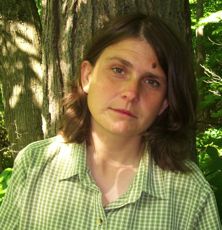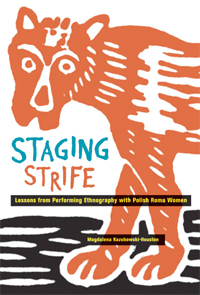Spotlight on New Faculty: Magdalena Kazubowski-Houston
 Magdalena Kazubowski-Houston
Magdalena Kazubowski-HoustonNew Theatre Studies professor Magdalena Kazubowski-Houston talks about her research interests doing performance ethnography with Polish Roma women, and her first months of teaching at York.
Please tell us about your work outside of teaching, your research and/or creative work.
The bulk of my research has involved working with Polish Roma (Gypsy) people. My doctoral project studied Roma women’s everyday experiences of violence in a small community in northern Poland. I conducted my research by means of performance ethnography, which is an approach to qualitative research that uses performance as both a research methodology and representation. In collaboration with a group of Polish Roma women, I developed a theatre performance in response to open-ended questions that addressed violence in the women’s lives.
I wanted to work with Polish Roma because I had witnessed numerous acts of discrimination and violence committed against the Roma people while living in Poland under communism, and during my subsequent visits there since 1992. I also thought that doing ethnographic work with Polish Roma was important because, when I had begun my research over a decade ago, there was still not a single published ethnography primarily conducted with Roma women anywhere. My desire to work with Roma women specifically was motivated my belief that the women were doubly victimized – first by living in a society that openly despised the Roma, and additionally, living in poverty within a traditionally male-dominated Roma culture. I wanted to create a space where the Roma women could tell their stories publicly, and performance ethnography seemed the best way to go about it. To me, theatre held the promise of a more participatory mode of ethnographic inquiry, and a means of telling audience members about the violence suffered by Polish Roma.

My current research project is, in some sense, a continuation of my previous work with Polish Roma women, but this time I am only working with two Roma elders. While to date ageing has not been my area of research, what drew my attention to this topic was the fact that Roma have been migrating abroad in large numbers since Poland’s entry into the EU in 2004, leaving many Roma communities in Poland populated primarily by elders. They are now not only dealing with racial prejudice, marginalization and violence, but also, like many seniors in Poland, with inequities based in age, gender and class. I am trying to understand how current socio-political transformations in Poland shape Roma women’s experiences of ageing in the absence of younger family members.
But my performance ethnography work has not been limited to Polish Roma. I also did performance ethnography projects with Polish and Jewish Holocaust survivors, low-income residents in Vancouver’s downtown Eastside, and Polish youth. My postdoctoral research – a large-scale project involving researchers affiliated with the University of British Columbia and University of Western Ontario – explored theatre performance as a method for the participatory, critical and empathic involvement of citizens in the development of health policy on preimplantation genetic diagnosis, a controversial method for selecting the genetic characteristics of embryos created through in vitro fertilization.
Finally, I have worked for over fifteen years as a professional theatre director, performer and playwright in Canada and Poland. In addition to earning an MFA in Interdisciplinary Directing from Simon Fraser University, I trained in theatre direction with Polish avant-garde theatre artist Józef Szajna, a principal collaborator of Jerzy Grotowski. In Poland, my decade-long partnership with the International Festival for the Fine and Performing Arts in Tczew has included the staging of two of my plays. In 2009, my production, Death is Within Me…, was invited to open the festival to commemorate the first anniversary of Szajna’s death. I also organized, as part of the festival, physical acting workshops with actors from across Europe.
So far, I have directed a wide range of plays ranging from the classics to contemporary Canadian works that have been staged in both Canada and Poland, but I have always been particularly drawn to absurdist theatre and physical theatre. For several years now, I have been researching the politicizing potential of physical theatre, drawing both on my studio work and existing scholarly literature in cognitive neuroscience.
What has your first month of teaching been like? or Where were you teaching before you came to York? How does York compare?
Coming to York’s Theatre Department has been like returning home for me. I had previously taught at Trent University in the Department of Cultural Studies, and at Wilfrid Laurier University in the Department of Anthropology. While both appointments were rewarding, my heart has always been in the theatre. I really missed teaching theatre students, attending student theatre productions, and working with colleagues who share my passion for theatre. At York, students are an immense pleasure to work with, and I am surrounded by all-things theatre! I know I will always cherish my first lecture at York on Greek drama. I was so thrilled to dig up and revise my old lecture notes, and to be back teaching theatre again. And because York and the Theatre Department support interdisciplinary work, I have ample opportunities to teach both theatre and anthropology. This has so far been a very fulfilling experience, as many of my graduate students have background/interests not only in theatre, but also in anthropology and ethnography, and they bring unique and interdisciplinary perspectives into our seminars. Some of my students are professional artists, so I really have the best of both worlds. I am really looking forward to involving students in my future research projects. My hope is to have graduate students participating in various capacities in my performance ethnography projects, and I would love to work with undergraduate students on my studio research on the politicizing potential of physical theatre.
What are looking forward to, now that you're at York—what's on the horizon for you?
I think York’s interdisciplinary environment is perfectly suited to my work that requires both studio and field research. In the near future, I am hoping to extend my storytelling project with the Polish Roma elders to other communities in northern Poland. I will be applying to York’s internal funding sources, as well the SSHRC Insight Development Grant to fund this research. I am also planning to work with Polish Roma in Toronto to study the Roma immigration experience. The outcome of this work will be a book manuscript that will examine my approach to dramatic storytelling developed with Polish Roma in relation to collective creation in Canadian theatre. I am also hoping to continue my research that draws on cognitive neuroscience to examine the politicizing potential of physical modes of expression and empathy in performance ethnography contexts. This research will require studio work with theatre students, and York is the ideal place for this kind of project. Finally, I am very excited about a new collaborative project I am currently involved in with colleagues from Simon Fraser University and York. We founded the Centre for Imaginative Ethnography (CIE) two years ago, and are gearing up for the official launch of the Centre’s website in the spring of 2013 here at York. The Centre is committed to advancing experimental, critical and politically conscious research. In the future, we are hoping to initiate a wide range of projects engaging other researchers and communities in creative work that bridges ethnography, fine arts and fiction, and seeks to address local concerns and needs.